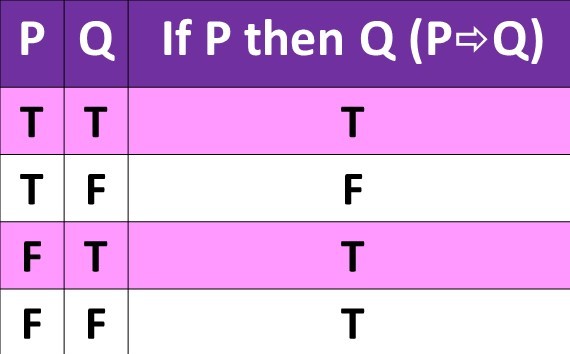
My mother was adamant about me taking every math class available during my junior- and senior-high school years, even when I had enough credits to graduate. It started in 7th grade when I was enrolled in a math probability class. To this day, my sweat glands go into overdrive as I remember such terms as conditional, biconditional, and converse statements. Just looking at If/Then truth tables causes me to clench my stomach in remembrance. Why was all this math necessary?
If/Then, or conditional, statements are simply rules. They follow a simple formula: hypothesis (If) and conclusion (Then). In math, the If element or the Then element, or both, may or may not be false.
When I read John 15:10 and Colossians 1:22-23, I was immediately reminded of those conditional statements. These scriptures provide clear rules for living a Christ-like life. These scriptures define how I can remain with, and in, God. And unlike the math truth table, the Bible’s conditional statements are never false. These two scriptures contain the same elements as the math conditional statement: the hypothesis—my personal action(s) required by God and the conclusion—God’s response to me fulfilling that action. Let’s take a look at my If/Then scriptures and examine what they tell me.
| John 15:10 (NIV): “If you keep my commands, you will remain in my love, just as I have kept my Father’s commands and remain in his love.” | Jesus is telling me that my personal action of obeying His commands, i.e. to love God with all of my being and to love and care for others[1], will conclude with me having and keeping His love. Translated into my layman’s terms, “If I give love, then I will always have the greatest love.” [1] Matthew 22:37-39 |
| Colossians 1:22-23 (NIV): “But now he has reconciled you by Christ’s physical body through death to present you holy in his sight, without blemish and free from accusation—if you continue in your faith, established and firm, and do not move from the hope held out in the gospel.” | Did you find the If element? It is midway through the scriptural passage and is two-fold: I must remain firmly rooted in my faith in God and hold fast to hope. This scriptural passage begins with the conclusion: Jesus, who through His death and resurrection has reconciled me to God, will present me before the Throne. Translated into my layman’s terms, “If I have enduring faith and steadfast hope in Christ, then my Savior will present a clean, unblemished me to God.” |
Notice also that the hypothesis in each scripture gives me free will. IF means that I have the option to do or not. And the THEN clearly tells me the consequences for accepting the hypothesis. I do not want to say “No” to God. If I live my life according to the hypothesis, then I can be assured of God’s conclusion. Now, when I come across If/Then statements during my Bible reading, I will pause. I will identify the specific hypothesis and conclusion of that passage and relate it to my life. I will work on living my If, so that God can bestow His Then. I guess those long-ago math skills do come in handy.
Reflection: When you read the Bible, how do you engage with the passage you have read? What do you do to make the passage real and relevant to your life?
This says it all. “I will identify the specific hypothesis and conclusion of that passage and relate it to my life.” Thank you!
While training to become an engineer, math was at the center of MOST of my classes. Dealing with conditional statements in class has greatly helped me in dealing with real life situations. I am at the point in my life now that I simplify EVERYTHING. No stress is my motto and utilizes conditional statements has made my life so much more enjoyable. Life is best enjoyed when it is kept SIMPLE.
This resonates with me and my math background. I never thought to look at scriptures using math logic. Now I will be looking more closely at scriptures from the mathematical prospective.